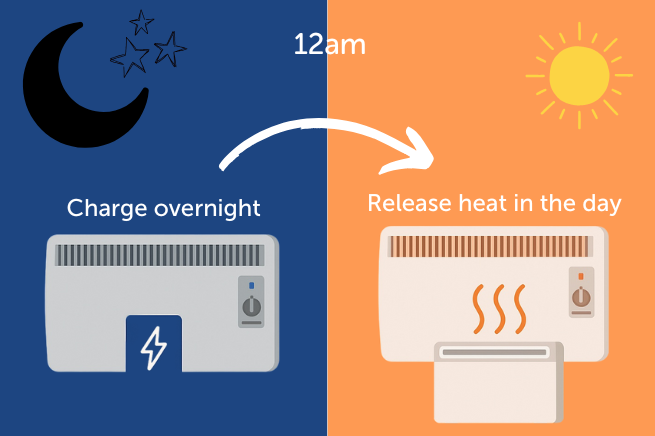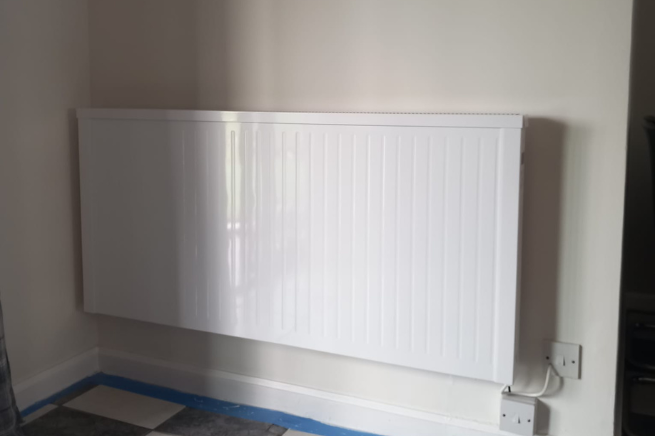
If you’ve been wondering whether your storage heaters are still a smart choice, or if they’re even allowed anymore, you’re not the only one. Since energy prices are now on the rise, EPC rules are getting tighter, and talks of phasing out inefficient heating are heard left, right, and center, many people across the UK are asking the same question:
Are storage heaters being phased out?
If you’re wondering the same thing then you’re in the right place; we’re here to clear it up.
No. To put it bluntly, they’re not. But that doesn’t mean that they’re still a good, or safe, option.
While it isn’t illegal to own a storage heater, government policies are still shifting towards low-carbon and high-efficiency heating. And they’re shifting rapidly.
In 2018, the Lot 20 regulations came into force, which mandated that all electrical devices (including electric heaters) must comply with an enhanced set of safety standards.
Older models, especially those installed before 2000, fall short of these standards, and they’re becoming harder to justify in homes or rental properties. While you can still use them, they tend to be bulky, inefficient and becoming much more costly to run.
So no, they’re not banned. But many people are shifting from asking “Can I keep them?” to “Are they worth it?”
Storage heaters were introduced decades ago, and worked well for that era. However, today’s energy landscape is very different. Here are a handful of reasons why many homeowners and landlords are looking to upgrade:
Expensive to run: Storage heaters rely on Economy 7, meaning they charge overnight. Most homes use standard tariffs nowadays, meaning running costs are higher since storage heaters aren’t designed for modern tariffs.
Limited control: Due to storage heaters running on Economy 7 and charging overnight to release heat the following day, they aren’t adaptable to British weather. And we all know that British weather is unpredictable!
Wasted heat: Since storage heaters release heat during the day, and it’s usually evenings when heat is wanted and/or needed, supplementary electric heaters are many peoples’ solution. This means the heat you’ve payed for is wasted in the day (since it isn’t needed) and you’re paying extra in the evening to run inefficient heaters.
EPC performance: Poor-performing heaters drag EPC scores down, making homes harder to rent or sell. If you are having to use these extra units to stay comfortable on an evening, your EPC score could suffer.

Yes, especially when they affect EPC ratings!
Rental properties in the UK require an EPC rating of an E, potentially rising to a C in the coming years. Storage heaters often contribute to lower ratings, especially older models which don’t run efficiently. Many housing associations and private landlords are already upgrading to beat the constantly increasing demand.
Heating has come a long way in recent years, with advanced technologies on the rise. The good news is that there are many alternatives on the market:
Smart electric radiators: One example is our NEOS electric radiator. With fast warm-up times, smart controls, and scheduling and zoning options. Our NEOS electric radiator also works with modern tariffs, like the Octopus Cosy Tariff, meaning users can make use of off-peak electricity for 8 hours throughout the day. The ‘Cosy Hours’ offer electricity for up to 51% lower than the standard rate. Click here to learn more!
High heat retention electric heaters: These models store heat more effectively and release is when needed. They work similarly to storage heaters but tend to also feature the bulky design and respond slower than smart electric radiators.
Infrared heaters: This type of heater warms objects rather than the air, which can make them useful in commercial or open-plan spaces. They are, however, less suited to cosy homes. To learn more about infrared heaters, click here.
If you’re unsure as to which heaters might work best for you and your space, our team can help! Click here to get in touch.

They’re not officially being phased out. But with tighter regulations, rising bills, and smarter technologies being available, it’s becoming clear that storage heaters are no longer the best fit for modern homes.
Whether you’re a homeowner wanting more control of your heating and your bills, or a landlord trying to stay ahead of the pending EPC regulations, it’s worth exploring your options now. Don’t wait until the rush kicks in and lead times increase!
We can help you compare the costs, controls and comfort between your current system with our multi award-winning NEOS electric radiator.
We’re not the type for pushy sales, we’re here to educate you on potential energy savings, and offer practical advice backed by British engineering.
Get in touch today for more information or to get your free quote today!
More on storage heaters:
Are Storage Heaters Efficient?
A Guide to Understanding Storage Heaters
Tags: General Guides.

If you are considering electric heating/electric radiators, then this guide tells you everything you need to know. Discover this modern, sustainable and economical method of heating that gives you complete control and comfort. Download Free Guide now.

*Trust Electric Heating needs the contact information you provide to us to contact you about our products and services. You may unsubscribe from these communications at any time. For information on how to unsubscribe, as well as our privacy practices and commitment to protecting your privacy, check out our Privacy Policy.
Quick installation and a 100 day warmth guarantee. Whether you’re buying one or several radiators, if our radiators don’t heat your room to a minimum of 20 degrees we will undertake to upgrade or replace the radiators free of charge.
Book your free consultation